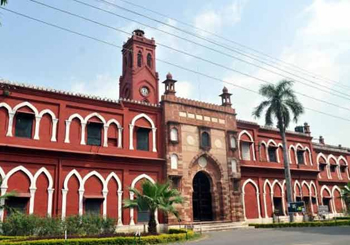Aligarh, Feb 20: The Aligarh Muslim University which has been battling to preserve its character as a minority institution now finds itself in another controversy – this time over beef.

The reports spread the impression that it was cow meat and not the meat of buffalo that was being served. A picture of the canteen's menu card also went viral on social media.
BJP Mayor Shakuntala Bharti, along with party leaders and several right wing activists, held a demonstration outside the office of Senior Superintendent of Police today, demanding registration of an FIR against the contractor of AMU medical college canteen for serving 'beef biryani'.
Police said the matter was still under investigation. As news of the controversy spread, senior AMU officials led by University Proctor M Mohsin Khan rushed to the Medical College canteen and carried out an on-the-spot preliminary check.
University spokesperson Rahat Abrar alleged that the incident was a "malicious" attempt to defame the institution, asserting that the beef mentioned in the menu was of buffalo meat.
"It is nothing but a malicious propaganda to defame this institution. I can say with confidence that the beef biryani mentioned in the menu card pertains to buffalo meat and there is no iota of evidence to suggest to the contrary," he said.
The spokesperson said that according to a preliminary investigation, it was revealed that the contract for the canteen was ending soon and some "vested interests" were eyeing it next, and so were creating a controversy.
"The contract for the canteen was ending on February 23. Some vested interests which were eyeing the lucrative contract deliberately floated a malicious rumour suggesting that cow meat was being served," he said.
Abrar, however ridiculed the allegations, saying that AMU was one of the first institutions to ban cow meat on campus more than a century ago.
"AMU was perhaps the first educational institution of higher learning where beef was banned from being served inside the institution more than a century back.
"The founding father of Mohammedan Anglo Oriental College (which became the Aligarh Muslim University in 1920), Sir Syed Ahmad Khan had issued an explicit order in 1884 that not only would no beef be served in any dining room but even sacrifice of cow during Idul Adha was forbidden for all AMU employees," he said.
Abrar said Sir Syed took the action as he did not want to hurt sentiments of Hindus and terminated services of an AMU employee in 1884, when he broke this rule.





Comments
Mr. Shatish &Mr. Atul Sabharwal's Al-Kabir is the most preferred beef brand in the Gulf.
Yes Rakesh there is to much demand for Indian Beef in middle east by Indian Hindus.
its so funny , pork is banned in one of the greatest religion of all time ..even though majority of its 6th century followers taste it secretly .i have seen demand here in middle east too
Its so FUNNY that ....Beef is not banned in Hindu scriptures
Add new comment